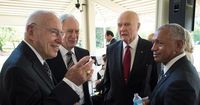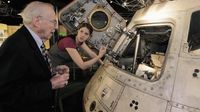Jim Lovell, the legendary astronaut who commanded the harrowing Apollo 13 mission and became a symbol of perseverance and calm under pressure, has died at age 97. NASA announced Lovell’s passing on August 8, 2025, with his family confirming he died the previous day in Lake Forest, Illinois. Revered for his leadership during one of spaceflight’s most dramatic episodes, Lovell’s life and career spanned the dawn of human space exploration, leaving an indelible mark on science and history.
Lovell’s journey began in Cleveland, Ohio, where he was born on March 25, 1928. Early on, he developed a fascination with planes and rockets, a passion that would steer the course of his life. Despite an initial rejection, Lovell persisted and was eventually accepted into the U.S. Naval Academy, graduating in 1952. He went on to serve as a fighter pilot, logging over 7,000 hours of flight time before joining NASA’s ranks.
In 1962, Lovell was selected as part of NASA’s “Next Nine”—a storied group that included Neil Armstrong and John Young. According to NPR, Lovell’s first spaceflight came in 1965 as pilot of Gemini 7, a mission that set a new endurance record, keeping him in space for almost 14 days. This feat was soon followed by his command of Gemini 12 in 1966, which brought the Gemini program to a successful close and cemented Lovell’s reputation as a skilled astronaut and leader.
Lovell’s next major milestone came in December 1968, when he served as the command module pilot and navigator on Apollo 8. Alongside Frank Borman and William Anders, Lovell became one of the first humans to leave Earth’s gravitational influence and orbit the Moon. The mission, which entered lunar orbit on Christmas Eve, captivated the world as the crew read a passage from Genesis while millions listened in. As Lovell later reflected in an NPR interview, “Just a small ball, blue and white. Like a Christmas tree ball hung in an absolutely black sky. I could put my thumb up and completely hide the Earth. Everything I knew was behind my thumb.”
But it was Apollo 13 that would define Lovell’s legacy. Launched on April 11, 1970, Apollo 13 was intended to be NASA’s third Moon landing. Instead, 55 hours, 55 minutes, and 4 seconds into the flight, disaster struck—an oxygen tank exploded, crippling the spacecraft and putting the lives of Lovell and his crewmates, Jack Swigert and Fred Haise, in grave jeopardy. Swigert radioed the now-famous message, “OK, Houston, we’ve had a problem here,” which Lovell repeated for clarity: “Houston, we’ve had a problem. We’ve had a Main B Bus Undervolt.”
The explosion caused severe shortages of water and electrical power and led to dangerously high levels of carbon dioxide. Faced with these challenges, Lovell and his crew, working closely with Houston ground controllers, turned their lunar module into an emergency lifeboat. For more than three days, they battled freezing temperatures, failing batteries, and mounting odds to return safely to Earth. The mission, which ended with a splashdown in the Pacific Ocean on April 17, 1970, became known as a “successful failure.” As acting NASA Administrator Sean Duffy noted, “Jim’s character and steadfast courage helped our nation reach the Moon and turned a potential tragedy into a success from which we learned an enormous amount.”
Lovell’s calm strength under pressure won him widespread praise. His family, in a heartfelt statement shared by NASA, wrote: “We are enormously proud of his amazing life and career accomplishments, highlighted by his legendary leadership in pioneering human space flight. But, to all of us, he was Dad, Granddad, and the Leader of our family. Most importantly, he was our Hero. We will miss his unshakeable optimism, his sense of humor, and the way he made each of us feel we could do the impossible. He was truly one of a kind.”
After Apollo 13, Lovell retired from the Navy and NASA in March 1973, having spent a total of 715 hours in space—a world record at the time. He later worked in the telecommunications industry, rising to executive vice president of Centel Corporation before retiring in 1991. His contributions were recognized at the highest levels: Lovell was awarded the Congressional Medal of Honor and the Presidential Medal of Freedom.
Lovell’s story was immortalized in popular culture by the 1995 film “Apollo 13,” directed by Ron Howard and starring Tom Hanks as Lovell. The movie brought the drama and danger of the mission to a new generation, making Lovell’s name synonymous with courage and ingenuity. Lovell himself praised the film’s realism, telling NPR that it “captured the highs-and-lows of the mission almost perfectly.”
Throughout his life, Lovell remained a passionate advocate for space exploration. He often spoke about the emotional impact of seeing Earth from afar and the importance of inspiring young people to pursue science and engineering. In a 2020 interview with the “TODAY” show, Lovell reflected, “I think I’m very fortunate. I think that I’ve lived a life that—if I had a chance to live all over again, even though if I knew what the consequences would be and the chance of coming back, you know, were not unknown at the time ... I would do it.”
Despite his many achievements, Lovell expressed disappointment at missing his only chance to walk on the Moon, a victim of the Apollo 13 accident. Yet, as he often said, the mission’s real triumph was the teamwork and ingenuity that brought the crew home safely, setting a standard for problem-solving and leadership under pressure.
Lovell was married to his wife Marilyn for over sixty years until her death in 2023, and he is survived by four children. His legacy endures not only in the annals of space history but in the hearts of those he inspired. As NASA’s tribute put it, “Lovell’s life and work inspired millions. His courage under pressure helped forge our path to the Moon and beyond—a journey that continues today.”
Jim Lovell’s remarkable journey from a determined young pilot to a global icon of space exploration stands as a testament to the power of perseverance, leadership, and the enduring human spirit.



